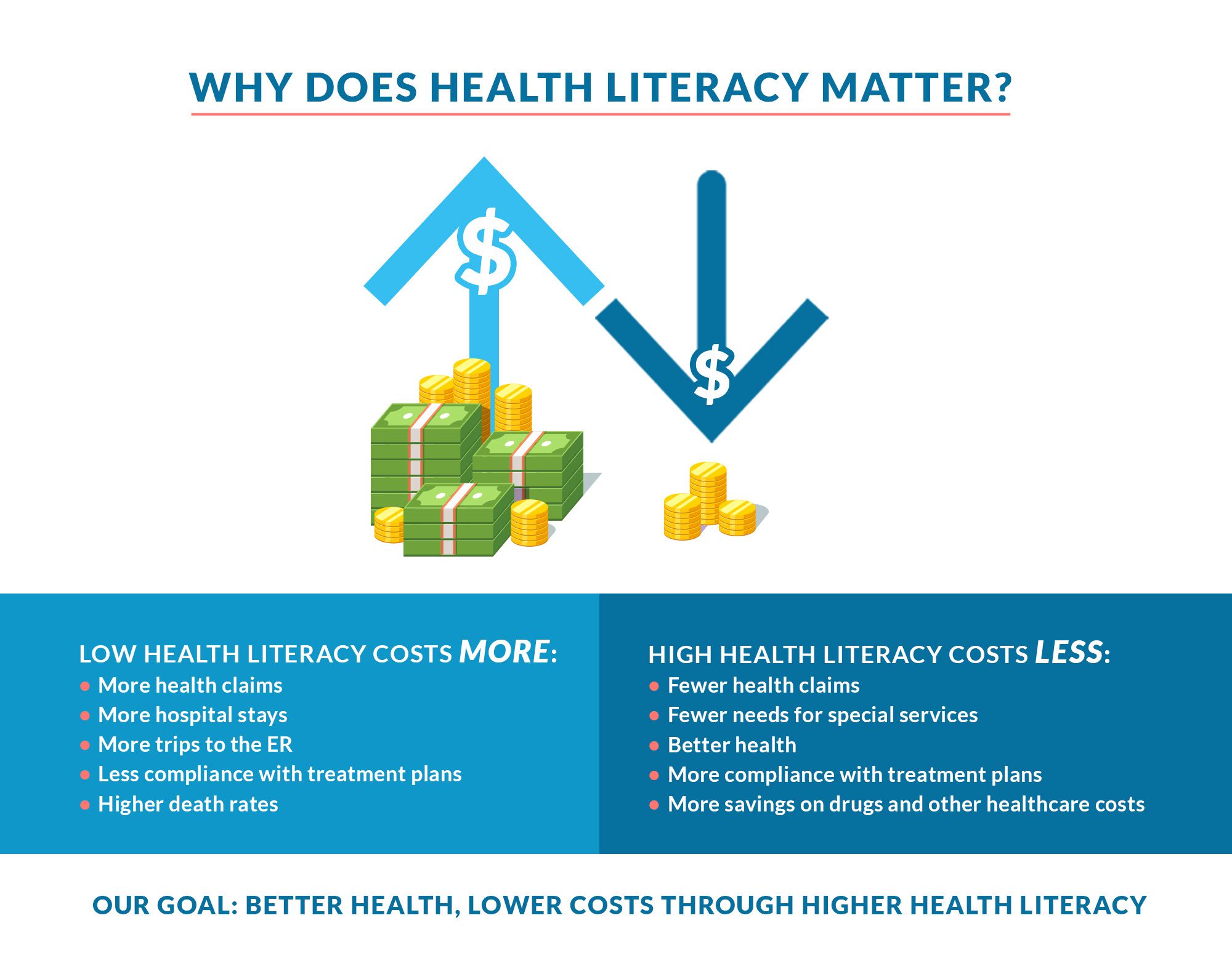Our October 3 webinar, “Improving Health Literacy: What Works & Why” — co-sponsored by EdLogics and Global Action Platform — got a great reaction from attendees.
Missed it? Watch the video below or on the EdLogics Newsroom, where you can also watch other videos, see past webinars, listen to interviews, check out our press kit, and more.
Improving Health Literacy: What Works & Why
Can anyone really lower the high costs of healthcare?
You can’t control many of the factors that contribute to high healthcare costs: expensive drugs, the cost of providers, rising insurance premiums. So, what can you do?
Improve health literacy, the ability to understand and act on health information.
Watch health literacy expert Russell Rothman, MD, MPP of Vanderbilt University and gamification guru Brian Primack, MD, PhD of the University of Pittsburgh outline problems with existing health education programs and describe real-life solutions.
Low Health Literacy Costs More, High Health Literacy Costs Less

EdLogics wants to improve low health literacy through education.
It’s not about avoiding medical care. It’s about getting the right care at the right time.
We want to empower people to make real changes in their day-to-day habits, so they can stay healthy and keep their families healthy, too.
We want to educate people to prevent sickness before it starts, to show them what to do and where to get care when they do get sick, and help them become well-informed, proactive healthcare consumers.
Ultimately, EdLogics wants to improve health outcomes, reduce the number of claims, and lower costs. For everyone.
Dr. Primack:
“In the US, 1 in 3 Americans can’t follow directions on a drug label. And I have to say, even with a medical degree, I sometimes get a prescription for one of my kids or something and I have to look at it pretty carefully with that small print and the code that it’s in. So it’s not surprising that it’s a challenge for many different people.”

Dr. Primack:
“When someone, for example, just has an ankle sprain — if they can access and follow good information that they have — then they very well might be the kind of person who will say, ‘You know, I don’t need to go the emergency room. I can wait.’
A couple days later, they’ve already improved with ice, elevation and rest — all things that are free.
Whereas another person who is having more difficulty understanding or accessing information might decide to go to the ER for the same condition, and the second they get through the ER door, already they’ve racked up very high costs. They’ve put themselves at risk for getting some kind of a hospital-acquired infection or some additional problem.
Even though this is one small example, when we start quoting issues like ‘90 million Americans have poor health literacy, and this costs an extra $150-200 a year,’ you can see how these numbers add up.”
Improving Health Literacy Makes a Difference
Knowing what to do to prevent chronic disease, how to take medications, and where to go when you’re sick — and acting on that knowledge — can have a huge impact on both personal health and the number of costly healthcare claims.
- Improved knowledge of health issues
- Improved behaviors
- Medication adherence
- Vaccines
- Childhood obesity prevention
- Diabetes self-management
- Asthma management
- Improved outcomes for:
- Diabetes
- Heart failure
- Obesity prevention
- Depression
Dr. Rothman:
“Even after you take into account a patient’s education level, their income, their insurance, and a host of other factors, we find that their literacy level is an independent predictor of how they do with their health.”
The Problem with Existing Health Education Programs
Of course, health education programs trying to raise people’s health literacy already exist.
But are they actually making a difference?

Pamphlets: Often don’t make it from the doctor’s office to the car.
Health websites: Too high-literacy, not personalized, and not always trustworthy.
Doctor visits: Patients may misunderstand, forget instructions, or feel too embarrassed to ask questions.
Dr. Rothman:
“And, unfortunately — and I say this as a primary care physician [laughing] — but there’s also a lot of variation in how well doctors communicate with their patients and their families. If you ask most clinicians we would, of course, tell you that we’re excellent communicators, and our patients all nod their heads and seem to understand everything that we say to them. … Some studies suggest patients only recall about 20% of what’s said to them by the time they get home.
So we like to think we’re all good communicators as clinicians, but a lot of us struggle — using a lot of jargon that might be hard for patients to understand, maybe speaking at too high of a literacy level without enough plain language, and giving people too much information to try to take in during one single visit. We often don’t assess patient understanding before they leave.”
Poorly designed games: Many focus on the wrong goal.
Dr. Primack:
“So there would be hamburgers and pieces of pizza, and you are supposed to shoot those, but the salad you are supposed to let live. You can probably imagine the next step, which was that they studied this and they found that being exposed to this game and playing this game a lot didn’t actually make people change their diet in any way.
It’s just a caution that even though sometimes gamification is really valuable, if the game is poorly designed, that’s just not a magic quick fix.”
Improving Health Literacy: What Actually Works
It’s one thing to learn more health facts.
It’s another thing to change your daily habits — the one thing that has more of an effect on health than any other single factor.
- Gamification and game-based learning
- Key principles:
- Competition, leaderboards, and peer comparisons
- Teamwork, shared goals
- Leveling up, increasing challenges, improving skill and knowledge
- Interactive content for better retention than passively-consumed content
- Unique incentives, cash drawings, charitable contributions, other benefits
Dr. Primack:
“The question is: Can we take principles of gamification and game based learning — the interactivity, the unique incentives — and can we use that to leverage for positive change? And what we have found is that, especially in the area of health literacy, there is a lot that we can do.”
- Multiple formats: words, pictures, videos
- Personalization: Content is tailored to the individual user based on age, gender, health conditions, interests, and family roles like caregiving
- Motivation and sustainability: Keep people engaged for real-life behavior changes
- Community resources: Further education and support
Dr. Rothman:
“What we really need to think about more is how to link people to other social support mechanisms to help them with their health. We have lots of studies now that really demonstrate that patients who have strong social support do much better with their health. There’s actually an epidemic of loneliness going on in a lot of countries.
And even when people are with their family, they may not have social support for disease that they’re dealing with.
So it can be really helpful to help a patient or employee and their family link to community resources — maybe to disease-specific organizations if they have a certain disease, or to a community organization that provides peer support. Or we can help them gain access to exercise or healthy food. Even to help them with getting additional support from their own family.”
Effective Health Literacy Education
- Personalized and engaging
- Addresses readiness for behavior change
- Applies principles of motivation for goal setting
- Activates participants
- Sets concrete, feasible goals
- Promotes follow-up for sustained behavior change
- Provides community resources for support
4 Things to Remember:
- Health literacy is a major problem in the US.
- Improving health literacy benefits everyone.
- We need a multi-faceted approach.
- There is no quick fix — but there IS hope.
Dr. Rothman:
“Health literacy is a major problem in the United States. We have at least 90 million Americans with only basic or below basic literacy skills. Even patients with good literacy skills can struggle to navigate what’s become a very complex healthcare system when trying to take care of their health or the health of their family.
We have found that by addressing health literacy issues, we can improve care for patients with low literacy. Studies have suggested that using good forms of health communication and addressing health literacy can even improve knowledge and behavior for people with high health literacy. So improving how we educate and communicate can be of great value to everyone.”
Dr. Primack:
“There are so many challenges here. If it were easy, we wouldn’t have 90 million Americans with low health literacy. But I think that it’s important to end on a positive note and say that we really are moving the needle. There have been studies that show that using the kind of principles that we talked about today really do help and change people’s lives. I think that that is what we need to hold up as we move forward.”
Subscribe now. Know when we publish our latest articles on health literacy, gamification, and healthcare.








